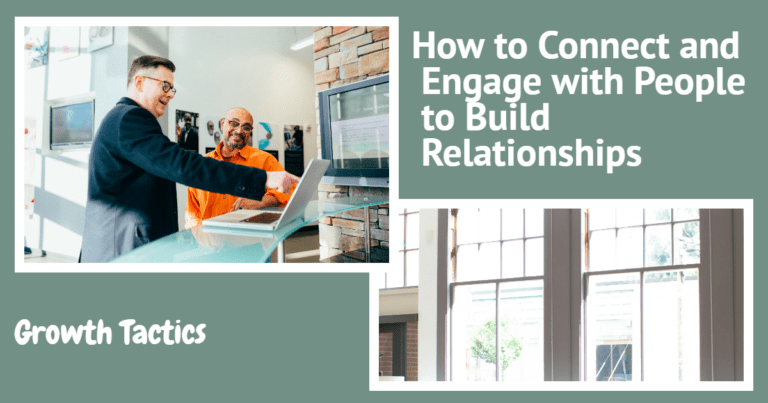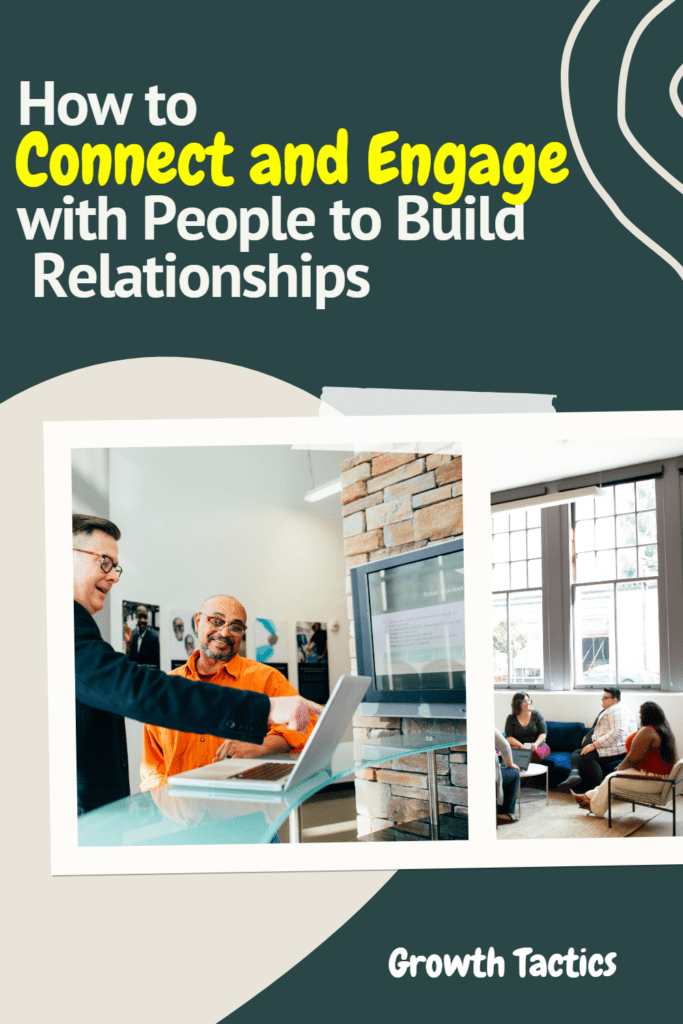In today’s interconnected world, the ability to connect and engage with people is more important than ever. Whether it’s in your personal life or the workplace, building meaningful relationships and fostering engaging conversations can have a profound impact on your happiness, success, and overall well-being. So let’s dive in and discover the key to building meaningful connections!
Jump To Section
People Remember the Way You Make Them Feel
When it comes to building genuine connections and leaving a lasting impression on others, it’s often said that people remember not what you say or do, but how you make them feel. Emotions play a powerful role in our interactions, shaping our memories and perceptions of the individuals we encounter.
The Emotional Connection
Emotional connections are the glue that binds relationships and interactions. When we engage with others on an emotional level, it creates a profound and memorable experience. Positive emotions such as happiness, joy, and gratitude can leave a lasting imprint, while negative emotions like anger, sadness, or disappointment can have a similarly enduring effect.
The Power of Positivity
Positive emotions have a unique ability to leave a lasting impression on the people we interact with. When we make others feel good, valued, and appreciated, they are more likely to remember the encounter fondly. Kindness, empathy, and genuine interest in others can cultivate positive emotions and contribute to building strong and meaningful connections.
Authenticity and Vulnerability
Authenticity and vulnerability play a crucial role in how others remember us. When we allow ourselves to be open and vulnerable, sharing our true selves without fear of judgment, we create a deeper level of connection. By being genuine and authentic, we make others feel comfortable doing the same, leading to more memorable and meaningful interactions.
The Ripple Effect
The emotional impact we have on others can extend far beyond the immediate encounter. Positive emotions can spread like ripples in a pond, influencing not only the individual we interact with but also those they interact with afterward. Similarly, negative emotions can have a ripple effect, detrimentally impacting others.
Cultivating Positive Emotional Experiences
To leave a lasting positive impression on others, there are several strategies we can employ:
- Choose your words and actions consciously: Be mindful of the impact your words and actions may have on others. Strive to be uplifting, kind, and positive.
- Share genuine compliments and expressions of gratitude: Sincere compliments and expressions of gratitude can make others feel valued and appreciated, creating positive emotional experiences.
- Be yourself: Authenticity is key. Allow others to see the real you, embrace vulnerability, and create a safe space for genuine connections to flourish.
The Power of Active Listening
One of the most valuable skills you can develop to connect and engage with people is active listening. Active listening involves paying attention to the person you’re talking to, rather than simply waiting for your turn to speak. It shows that you’re genuinely interested in what the other person has to say and that you value their thoughts and opinions.
To become an active listener, it’s essential to eliminate distractions and focus solely on the conversation at hand. Avoid checking your phone or looking around the room, as this can make the other person feel unimportant and diminish the quality of the interaction. Instead, maintain eye contact and use open-ended questions to encourage the person to share more about their experiences and perspectives.
The Importance of Empathy
Empathy plays a pivotal role in building meaningful relationships. It involves being able to understand and share the emotions and experiences of another person. When you demonstrate empathy, you create a safe and supportive environment for open and honest communication. This allows for a deeper understanding of each other’s perspectives and experiences, fostering stronger connections and bonds.
To cultivate empathy, practice placing yourself in the other person’s shoes. Try to imagine how they might be feeling and what their experience is like. This requires setting aside your own preconceived notions and biases and being open to seeing the world from their perspective. By doing so, you can respond with compassion and provide genuine support.
Providing Meaningful Support
Empathy empowers you to provide meaningful support to others. When someone shares a difficult experience or expresses their emotions, responding with empathy can make a significant difference. Acknowledge their feelings and validate their experiences. Let them know that you understand and appreciate their perspective.
Offering words of encouragement or sharing your own similar experiences can also be impactful. By relating to their situation, you establish a connection based on shared understanding. This helps to build trust, as they feel that you genuinely empathize with them.
Strengthening Connections Through Empathy
By incorporating empathy into your interactions, you can strengthen your connections with others. When people feel understood and valued, they are more likely to trust and open up to you. Empathy creates a sense of camaraderie and fosters mutual respect, leading to deeper relationships.
Through empathetic listening, you not only understand the other person’s viewpoint but also gain insights into their motivations, desires, and fears. This deeper understanding allows for more meaningful conversations and interactions. It encourages vulnerability and creates a safe space for authentic sharing.
The Power of Eye Contact
While it may seem like a small gesture, maintaining eye contact is a powerful way to connect and engage with people. Eye contact shows that you’re fully present and actively listening to the other person. It conveys respect, interest, and sincerity, making the other person feel valued and appreciated.
Additionally, eye contact can help establish a sense of trust and authenticity. When you maintain eye contact during a conversation, it shows that you’re confident and engaged, which can foster a positive and open atmosphere. People are more likely to share their thoughts and feelings when they feel comfortable and trust that you are genuinely interested in what they have to say.
The Art of Engaging Conversation
Engaging in meaningful conversations requires more than just talking; it involves active participation and genuine interest in the other person. Learning how to ask thoughtful questions and respond with empathy can deepen the connection and create a meaningful exchange. By exploring topics that resonate with both parties and actively listening to each other’s perspectives, you can foster a sense of mutual understanding and respect.
Curiosity and Open-mindedness
To engage in conversation effectively, it’s crucial to cultivate curiosity and open-mindedness. Be genuinely interested in the other person’s thoughts, opinions, and experiences. Approach discussions with a sense of curiosity, striving to learn something new or gain a different perspective. By demonstrating a willingness to listen and learn, you create a space that encourages open and honest communication.
Finding Common Ground
Engaging conversations are built on finding common ground. Explore topics that interest both parties and encourage them to share their thoughts and experiences. Look for shared experiences, values, or beliefs that can act as a starting point for deeper discussions. By finding common ground, you establish a sense of connection and create a space where everyone feels comfortable sharing their thoughts and ideas.
Asking Thoughtful Questions
Asking thoughtful questions is an important skill in engaging conversations. Avoid asking basic, yes-or-no questions, and instead, strive for open-ended questions that encourage the other person to provide more detailed responses. These questions prompt deeper thinking and reflective answers, leading to more insightful discussions.
Here are some examples of thoughtful questions that can help foster engaging conversations:
Instead of asking “Do you like to travel?”, you could ask:
- “What is the most memorable travel experience you’ve had and why?”
- “If you could visit any place in the world, where would you go and why?”
Rather than asking “What do you do for work?”, you could ask:
- “What led you to pursue your current career, and what do you find most rewarding about it?”
- “If you could choose any profession, regardless of money or education, what would you be doing?”
Instead of asking “Are you a fan of any sports teams?”, you could ask:
- “What sports or athletic activities have played a significant role in your life, and why?”
- “What is your fondest memory related to sports, either as a participant or a spectator?”
Rather than asking “Do you have any hobbies?”, you could ask:
- “What are some activities or interests that bring you joy and fulfillment outside of work?”
- “If you had a completely free day to yourself, how would you choose to spend it?”
Instead of asking “Have you read any good books lately?”, you could ask:
- “What book has had the most significant impact on your life, and why?”
- “If you were to recommend one book to others, what would it be and why?”
By asking these types of thoughtful questions, you’ll encourage the other person to share more about their experiences, interests, and passions. This deepens the conversation and allows for a more meaningful and engaging connection.
Overcoming Awkwardness and Building Genuine Connections
Sometimes, connecting and engaging with people can feel awkward or uncomfortable, especially when meeting new people or in unfamiliar social situations. However, it’s essential to overcome these barriers and push yourself out of your comfort zone to build genuine connections.
One way to overcome awkwardness is by being authentic and vulnerable. When you share your true self and show vulnerability, it allows others to do the same. This authenticity creates a safe and non-judgmental space for meaningful connections to flourish.
Another technique to build genuine connections is by actively demonstrating your interest in others. Ask thoughtful questions and give the other person your full attention. By doing so, you show that you genuinely care and are invested in getting to know them. This approach helps break down barriers and establishes a foundation for a deeper and more meaningful connection.
Exploring Different Ways to Connect
Shared Activities: Bonding Through Collaboration
Engaging in shared activities or collaborative projects is a powerful way to connect with others. When you work together towards a common goal, you build a sense of camaraderie and teamwork. Whether it’s a work project, a community initiative, or a creative endeavor, collaborating allows you to connect on a deeper level and create shared memories.
Social Events: The Power of Gathering
Participating in social events provides opportunities to connect with people who share similar interests or experiences. Whether it’s a networking event, a party, or a community gathering, these events offer a platform to meet new people and forge connections. By engaging in conversations and being open to new connections, you can expand your social network and create meaningful relationships.
Quality Time: The Importance of Presence
Spending quality time with others is crucial for building deep connections. Whether it’s one-on-one time or group activities, being present and fully engaged in the moment fosters a sense of connection and intimacy. By dedicating uninterrupted time to the people you care about, you show that you value and prioritize the relationship.
Stepping Outside Your Comfort Zone: Uncovering New Opportunities
Connecting with others often requires stepping outside your comfort zone. Trying new activities or exploring unfamiliar territories can open doors to connection. By embracing new experiences, you may meet people who share your interests or discover new passions. Don’t be afraid to take risks and venture into uncharted territory to find unexpected opportunities for connection.
Conclusion
Connecting and engaging with people is a fundamental aspect of our lives, whether it’s in our personal relationships or in the professional realm. By developing the skills of active listening, empathy, and maintaining eye contact, we can build stronger connections and foster more meaningful conversations. By engaging in thoughtful and genuine dialogue, we create an environment that allows everyone involved to feel valued and heard. So let’s embrace the power of connection and start engaging with people in our lives, one conversation at a time.


